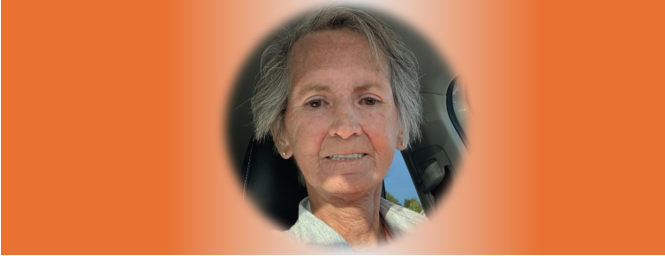
Community Council Spotlight: Lynn Brant
October 15, 2025.
Spiritual Health, Traditional Healing and
Building a Good Way Forward
Lynn Brant is a proud Mohawk woman from Tyendinaga Mohawk Territory. A passionate advocate for Indigenous healing, she has devoted much of her personal and professional life to increasing access to traditional healing and building understanding of how its inextricably linked to overall health and wellbeing, especially for the Indigenous community.
Lynn was the first Indigenous Nurse Practitioner at the Napanee Area Community Health Centre (NACHC) and later served as an Indigenous Navigator with Kingston Health Sciences Centre. She is an inaugural member of the Indigenous Health Council (now the Indigenous Health and Wellness Council or IHWC), and currently serves as co-chair alongside Mireille LaPointe of Ardoch Algonquin First Nation. Lynn is also a member of the Frontenac, Lennox and Addington Ontario Health Team’s (FLA OHT) leadership table—the Transitional Leadership Collaborative—and she is an active member of the Community Council and a team focused on Indigenous Palliative Care strategies. We sat down with Lynn, on her way to an IHWC meeting, to learn more about what drives her to be an engaged community leader, how the IHWC is evolving, what Indigenous health and wellness means to her, and what meaningful partnership looks like.
The growth of the Indigenous Health and Wellness Council
The IHWC began with a practical purpose. Founded by Maureen Buchanan—an Indigenous Nurse Practitioner who succeeded Lynn at NACHC—it was created to support that role and guide Indigenous programming. Over the years, the Council grown in its membership and scope, adapting to better meet the needs and priorities of local Indigenous communities. “I’m excited by the growth of the IHWC in the last two years,” Lynn says. “More people—Indigenous and non-Indigenous—are coming to the table for guidance and support on Indigenous programming and culturally safe care.”
With that growth has come reflection. The Council regularly looks inward at its purpose and impact and outward at pressing needs of the Indigenous community to stay effective. “We’re revamping,” Lynn shares. “We’re honing in. For me, the Council should support the health and wellness of its members. We’re asking: what do our members need, and what should we put in place?” Lynn explains that the best way to determine what their members need is by listening to them. “We hold sharing circles to hear what’s happening across member organizations,” she says. “We ask for priorities abd where the IHWC should focus. That's the Indigenous way—to listen to the people, then move forward with what they want—that’s how [we can] best serve the Indigenous community.”
What is Indigenous Health and Wellness?
From Lynn’s perspective, traditional healing begins with spiritual health and flows through emotions, mind, and body. “I believe that if we don't take care of our spirit, emotions, mind, then our physical body gets compromised,” she says. “We need to have a healthy mind, which, in my [Mohawk] language is Ka\'nikonhrí:io – to have a good mind.”
Lynn explored the idea of spiritual health during her master’s studies, where she determined that for her, “Spiritual health is that place where there's no sense of time or negativity—you feel good,” she explains. She likens it to being with a newborn: innocence, beauty, love, awe. “Spiritual health is making space to be in spirit.”
For Lynn, bridging this understanding with everyday care is necessary in order for Indigenous healing to become more widely accepted. “I believe that if medical practitioners would even just plant the seed, ‘Have you thought about the health of your spirit—and what that means?’ [we’d have better physical outcomes].” To do this well, she notes, providers need education, support, and permission within their teams to practice culturally safe care.
What meaningful partnership looks like
Turning principle into practice requires pace and presence – in order for there to be increased Indigenous health and wellness and traditional healing, there needs to be meaningful engagement with Indigenous communities. “For me, it’s not feeling rushed,” Lynn says. “If we’re going to engage, we should engage in a good way.” That means slowing down, being present, and bringing a good mind to the work. As a concrete starting point for FLA OHT members, she recommends Indigenous Cultural Safety training. “It benefits any nation of peoples, not just Indigenous nations,” she notes. Greater awareness, understanding, compassion, and kindness help us approach both care and daily life in a good way.
What’s next
Looking ahead, Lynn hopes to see traditional Indigenous healing recognized on equal footing with Western medicine and more Indigenous voices at decision-making tables—including within the OHT. Lynn’s leadership calls us to listen first, make space for spirit, and move at the speed of trust. She invites all of us to help create culturally safe care by showing up with a good mind, participating in Indigenous Cultural Safety training—and making a conscious effort to put that training into daily practice—and lifting Indigenous voices in every room where decisions are made.
Building on this vision, the FLA OHT is co-designing initiatives with Indigenous partners, and promoting respectful dialogue and inclusion of Indigenous voices at FLA OHT tables. Recent work includes expanding Indigenous Cultural Safety learning, commissioning Indigenous artworks to create welcoming care spaces across partner sites, and collaborating with Queen’s University on community-engaged research to inform FLA OHT governance, engagement and policy. The FLA OHT also maintains regular engagement with the IHWC, elevates Indigenous voices at leadership tables, communicates about access to Indigenous-led services and supports, and supports partners in connecting to training opportunities, resources and toolkits. We will continue to build relationships and centre Indigenous perspectives in planning and care delivery across the region.
Lynn believes this balance will lead to better, more culturally safe care for everyone. “I’m an Indigenous woman, and I’m passionate about traditional healing—with spiritual health at the forefront,” she says. “If I can bring that voice to the table, my job is fulfilled.” Nyawen, Miigwech, thank you to Lynn for lighting the path.
